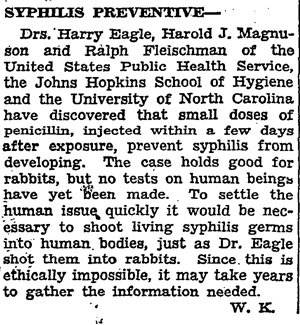2000: “The Body Hunters” Exposed; 75 Experiments Halted at Oklahoma University
2000: Office of Protection from Research Risks (OPRR) was shifted from NIH jurisdiction to the Department of Health and Human Services (DHHS), and was renamed Office of Human Research Protection (OHRP). OHRP posts letters of determination following investigations into ethical violations. See Government Investigations adapted from OPRR Compliance Oversight Investigations Resulting in Restrictions to MPA, January 1990 to August 2001. The first disciplinary action of the newly constituted OHRP was to order all research programs at the University of Oklahoma halted after its investigation.
2000: Following a federal investigation by OHRP, 75 clinical trials were suspended at the University of Oklahoma.
The investigation first focused on one experiment, in which patients with the fatal skin cancer melanoma were given a test vaccine. The trial was halted for numerous safety and ethics violations and failure to follow the protocol. The OHRP investigation showed that about 100 patients in one experiment conducted by Dr. Michael McGee, were injected with a vaccine that had been made by unqualified laboratory workers and had never been tested for safety. It was either destroyed or labeled ”not for use in humans.” Doctors deceived patients by stating that the experiment might reduce the size of their tumors, when in fact the study was intended only to test the toxicity of the vaccine, not to treat patients. Of the 100 enrolled in the experiment, 26 died.
In reviewing that experiment, federal and university officials found that the center’s Institutional Review Board was routinely violating federal safety and ethics rules. Federal investigators found that university officials had failed to inform patients of the vaccine’s safety problems and misrepresented the reason the experiment was being halted. (Safety Concerns Halt Oklahoma Research, The New York Times, July 11, 2000)
The Washington Post reported that Dr. McGee had violated OHRP’s directive to inform surviving participants and primary care physicians by misrepresenting the truth:
“in an April 10 letter to participating researchers and surviving patients, and in a May 17 report to the IRB, McGee wrote that the study had been suspended because so many patients had expressed interest in the study that they had run out of vaccine. McGee also wrote that there “are no significant safety issues.”
2000: “Body Hunters” a 6 part series in The Washington Post
“Body Hunters” exposes unethical exploitation in drug experiments conducted by U.S. investigators in underdeveloped countries. The series is the result of an 11-month reporting effort on five continents led by reporters Joe Stephens, Deborah Nelson and Mary Pat Flaherty of The Washington Post‘s investigative staff.
Part 1: Nigeria-Pfizer;
Part 2: Tidal Wave Experiments Overseas;
Part 3: Dilemma: Submit or Suffer ‘Uninformed Consent’ is rising ethic;
Part 4: U.S. gov. funded, genetic experiments in rural China conducted by Harvard;
Part 5: Latin America I Ripe for Trials and Fraud;
Part 6: …Luck of the Draw in Third World Drug Tests
2000: Former Holmesburg prisoners file lawsuit against the University of Pennsylvania
Inspired by Alan Hornblum’s book, Acres of Skin, nearly 300 former inmates of Holmesburg prison sued the University of Pennsylvania, Dr. Albert Kligman, Johnson & Johnson and others for injuries resulting from the prison experiments. The suit was dismissed because of the statute of limitations had expired.
2000: Near the end of her term as Secretary of HHS, Donna Shalala acknowledged in New England Journal of Medicine,
“I did not expect, or want, to complete my tenure . . . by raising questions about the safety of patients in clinical research. However, recent developments leave me little choice. . .” Protecting research subjects–what must be done,” NEJM,2000.
2000: President Clinton implemented the Energy Employees Occupational Illness Compensation Act of 2000, which authorized compensation for thousands of Department of Energy workers who sacrificed their health in building the nation’s nuclear defenses.




